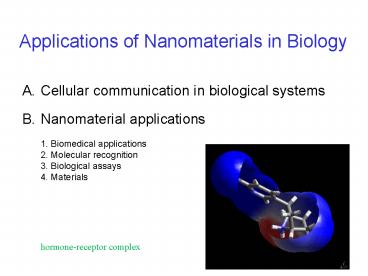Applications of Nanomaterials in Biology - PowerPoint PPT Presentation
1 / 30
Title:
Applications of Nanomaterials in Biology
Description:
detection and drug delivery for disease. many applications; cancer is major target ... monitor physiological conditions. blood pressure, hormone concentrations, ... – PowerPoint PPT presentation
Number of Views:892
Avg rating:3.0/5.0
Title: Applications of Nanomaterials in Biology
1
Applications of Nanomaterials in Biology
- A. Cellular communication in biological systems
- Nanomaterial applications
- 1. Biomedical applications
- 2. Molecular recognition
- 3. Biological assays
- 4. Materials
hormone-receptor complex
2
Lipid soluble messenger pathway
3
Types of Cellular Communication
4
Signaling Outcomes
5
Cell growth and differentiation
6
Biomedical Applications
- detection and drug delivery for disease
- many applications cancer is major target
7
Disease diagnostics
Cross-sectional magnetic resonance image of
human brain
8
Brain showing tumor
9
(No Transcript)
10
Hypothetical nanosensors in the brain
11
Drug Delivery for Disease
Cancer treatment
12
Progression of cancer development
13
Metastasis
14
- delivery of agent (drug)
- specificity of agent for
- cancer cells
- efficacy of agent
- side effects
15
Molecular recognition
- quantification of molecular interactions
- discovery aspect pharmaceutical industry
16
Drug Discovery
17
heat?
18
Scripps- PARC enthalpy array
- drug discovery uses
- the nanocalorimeter
- detects temperature
- differences when
- chemicals interact with
- cells
- sensitivity is 1 millionth
- of a degree Celsius
19
Detection of Biomolecules
- basic research, forensics,
- environmental health, toxicology,
- food safety
- IR fluorescence, radioactive platforms
20
Kodak In Vivo Bioimaging System
21
Biological Assays
- nanoscale genomics
- biosensors
22
Genomic research
Worldwide government and non-profit funding in
excess of 1 billion
23
(No Transcript)
24
Biosensors
- monitor physiological conditions
- blood pressure, hormone concentrations,
- neural activity, body temperature
glucose and lactate sensor
25
- glass substrate with
- functionalized surface
- (e.g., Ta2O5, TiO2,
- Nb2O5)
- antibodies (yellow)
- attached to surface
- capture proteins (green)
26
Passive inducible transponder tag
27
Materials
- biomolecular engineering
- biomotors
28
Bone replacement material OSferionTM
(b-tricalcium phosphate) from Olympus
29
(No Transcript)
30
ATPase Biomotor
Montemagno et al., Cornell University































